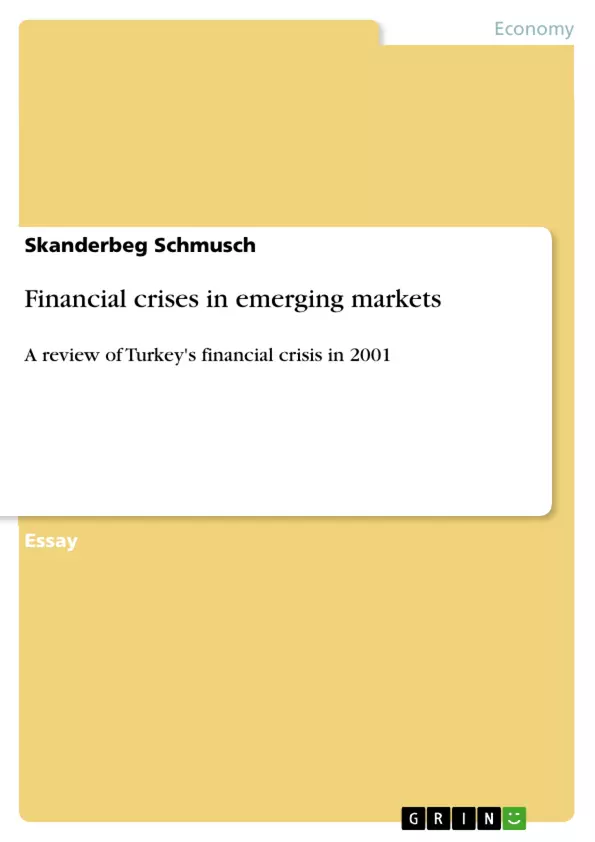This paper attemps to picture the economical background of Turkey prior to the 2001 crisis, and then analyze the main characteristics of environment in which such a large scale
nancial crisis could break out. The following section will
rstly introduce an overview of the basic theoretical literature on
nancial crises in emerging
markets, as this may contribute towards a better comprehension of the economical interrelations of the theoretical framework in which the Turkish
nancial crisis is embedded. Section 3, then, provides the Turkish case in detail. To familiarize the reader with the economical and political enviroment in which the crisis could occur,
the
rst subsection will provide a brief account of the Turkish economy prior to the crisis, special emphasis will be on the
nancial liberalization proccess and the resulting changes in the banking sector. The tide of events of the crisis itself as well as its economical consequences and policy responses are part of the second and third subsection respectively. The paper will be concluded by summing up the essential causes and main characteristics of the crisis and an attempt to assign its place in the theoretical framework.
Inhaltsverzeichnis (Table of Contents)
- The Issue
- Financial Crises in Emerging Markets: A Basic Theoretical Framework
- Emerging Market Economies
- Financial Crises in Theory
- The Turkish Case
- Prior to the Crisis: The Economical Background
- Financial Liberalization
- The Banking Sector
- The International Monetary Fund and Desinflation Efforts
- Februay 2001: The Crisis
- The Aftermath of the Crisis
- Prior to the Crisis: The Economical Background
- Conclusion
Zielsetzung und Themenschwerpunkte (Objectives and Key Themes)
This paper aims to provide a comprehensive analysis of the 2001 financial crisis in Turkey, placing it within the context of broader theoretical frameworks related to financial crises in emerging markets. The paper explores the economic background leading up to the crisis, examines the key characteristics of the environment that allowed for such a crisis to unfold, and analyzes the consequences of the crisis and subsequent policy responses.
- The impact of financial liberalization and integration of emerging markets into global capital flows.
- The vulnerabilities of emerging market economies to financial crises, particularly those implementing exchange rate-based stabilization programs.
- The role of speculative short-term capital inflows in exacerbating financial crises in emerging markets.
- The economic and political environment in Turkey prior to the 2001 crisis, including the banking sector and international monetary fund involvement.
- The consequences of the Turkish financial crisis, including capital outflows, impact on domestic savings, and policy responses.
Zusammenfassung der Kapitel (Chapter Summaries)
The paper begins by introducing the issue of financial crises in emerging markets, highlighting the potential benefits and risks associated with international capital flows. It then delves into a theoretical framework for understanding financial crises in emerging markets, defining key characteristics of emerging market economies and outlining common theoretical perspectives on crisis development.
The following chapter focuses on the Turkish case, providing a detailed analysis of the economic background preceding the 2001 crisis. This analysis includes a discussion of financial liberalization, changes in the banking sector, and the role of the International Monetary Fund in deflationary efforts. The chapter then explores the events of the crisis itself and the subsequent economic consequences and policy responses.
Schlüsselwörter (Keywords)
Key themes and concepts explored in this paper include emerging market economies, financial liberalization, capital flows, financial crises, exchange rate-based stabilization programs, speculative short-term capital inflows, banking sector, International Monetary Fund, economic growth, and Turkey's 2001 financial crisis.
Frequently Asked Questions
What were the main causes of the 2001 Turkish financial crisis?
The crisis was caused by a combination of rapid financial liberalization, vulnerabilities in the banking sector, political instability, and the failure of exchange rate-based stabilization programs supported by the IMF.
How did financial liberalization contribute to the crisis?
Liberalization led to massive, often speculative, short-term capital inflows. When investor confidence wavered, these flows quickly reversed, leading to a liquidity crunch and currency collapse.
What role did the International Monetary Fund (IMF) play?
The IMF supported disinflation efforts and stabilization programs in Turkey. However, the rigid nature of these programs and the delayed response to banking sector weaknesses are often cited as contributing factors to the crisis's severity.
What are the characteristics of emerging market financial crises?
Emerging market crises are often characterized by high volatility, a sudden stop in foreign capital, sharp currency devaluations, and significant impacts on domestic savings and economic growth.
What was the aftermath of the Turkish crisis?
The aftermath included a deep recession, a restructuring of the banking sector, and a shift in economic policy toward more flexible exchange rates and strengthened institutional oversight.
- Quote paper
- Skanderbeg Schmusch (Author), 2008, Financial crises in emerging markets, Munich, GRIN Verlag, https://www.grin.com/document/116111



